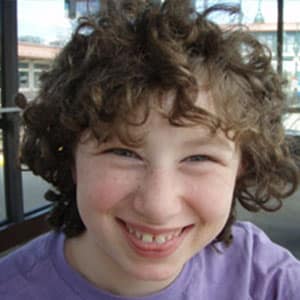The other night at dinner, our 10-year-old daughter, Rebecca, had what we think was her 10,000th epileptic seizure. It was a split-second drop seizure, which sucked the air out of her body and sent her head crashing face first into her plate of pasta.
As usual, Rebecca wiped the food off her face and reached out for a hug. After checking for missing teeth, my wife and I hugged her as she fought off the tears and smiled. She’s a resilient kid, but she needs more than hugs from her helpless parents. She, like millions of other people with epilepsy needs a cure for this devastating disease, which has compromised her young life despite the best efforts of her doctors, 24 unsuccessful drug trials and a dozen experimental therapies.
Fifty million people worldwide suffer with epilepsy, including 3 million in the United States alone. That’s more than multiple sclerosis, cerebral palsy, muscular dystrophy and Parkinson’s disease combined. Every year, an estimated 50,000 deaths occur nationwide from status epilepticus (prolonged seizures), Sudden Unexpected Death in Epilepsy (SUDEP) and other seizure-induced causes such as drowning.
In this era of major medical advancements, surprisingly little is known about why epilepsy occurs in so many adults and children. Two thirds of those diagnosed with epilepsy, including Rebecca, have seizures classified as “idiopathic,” which means doctors have no idea why they occur, sometimes as often as 100 times a day. Epilepsy is frequently misdiagnosed, as well, and the subsequent delay in treatment makes successful seizure control even more unlikely.
When we first witnessed Rebecca’s seizures as an infant, our pediatrician dismissed her violent body movements and muscle jerks as nothing out of the ordinary and attributed them to her being gaseous from indigestion. Eight months later, a pediatric gastroenterologist told us she didn’t have acid reflux; she had epilepsy. We needed to see a neurologist.
While some people with epilepsy are fortunate enough to achieve seizure control or outgrow their seizures, one third do not. Most patients endure serious side effects from drugs and treatments such as surgery. And the impact of uncontrolled seizures and drugs on children like Rebecca often causes lifelong learning deficits and developmental delays, which makes finding the right schooling and appropriate level of care a significant challenge.
As is the case with any serious illness, having a parent or child with epilepsy can undermine the emotional and financial health of families, leading to higher rates of depression, divorce and even bankruptcy. Living without health insurance only exacerbates these challenges.
During our journey with Rebecca, we have been fortunate to meet with some of the most respected neurologists in the nation, as well as senior officials at the National Institutes of Health. Despite their best intentions, it’s painfully clear that more research needs to be done on the root causes of epilepsy and the development of safer, more effective treatments. As one prominent West Coast neurologist explained to us in a moment of candor: “There is nothing we can do to help your daughter.” That’s not the sort of news any parent wants to hear.
The list of successful people who have had epileptic seizures includes Truman Capote, Richard Burton and Neil Young. Historians also believe Vincent Van Gogh, Beethoven, and Isaac Newton exhibited symptoms consistent with epilepsy. And when Supreme Court Chief Justice John Roberts suffered his second documented seizure earlier this summer, many doctors concluded he has epilepsy, which is defined as two or more unprovoked seizures. But most victims continue to suffer in silence, living substandard lives in the shadows of a culture that shows little understanding of their plight. Epilepsy still carries with it an unfortunate stigma and leaves many people hiding the condition from their employers, co-workers and friends.
To add to this burden, Hollywood films and TV shows routinely feature insensitive jokes about epilepsy, as if someone having a seizure is something to laugh about. But I can assure you that having a loved one with epilepsy is no laughing matter.
Until more research leads to a significant medical breakthrough, it will be tough for anyone to live well with epilepsy. In our family’s case, we just try to live on in spite of it and hope that someday soon, something will change for the better and Rebecca can enjoy her pasta in peace.





